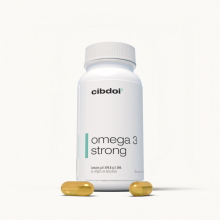Does Omega-3 Have Any Side Effects?
Published:
Omega-3 fatty acids have become one of the most popular dietary supplements due to their wide array of purported health benefits. However, some people wonder about the safety of taking omega-3s and worry about potential side effects. In this article, we’ll provide an objective look at the evidence on omega-3 side effects and safety considerations.
Contents:
What Are Omega-3s?
Before discussing side effects, let’s briefly review what omega-3s are and why people take them.

Omega-3s are a type of essential polyunsaturated fatty acid important for human health. The main omega-3s of interest are:
- EPA (eicosapentaenoic acid)
- DHA (docosahexaenoic acid)
- ALA (alpha-linolenic acid)
EPA and DHA come primarily from seafood and fish oil. ALA comes from plant sources like flaxseeds and walnuts.
Omega-3s are taken to help manage heart disease risk factors, improve brain function, reduce inflammation, and more. But do these benefits come with any risks or side effects?
Generally Well-Tolerated
The majority of research indicates omega-3 supplements are well-tolerated by most people at commonly recommended doses.
For example:
- High-quality meta-analyses conclude omega-3s have a good overall safety profile with very low risk of serious side effects or adverse events.
- Large cohort studies following thousands of adults long-term find regular omega-3 supplement use does not increase overall health risks.
- Most reported side effects are mild and temporary, like fishy taste, gastrointestinal upset, or loose stools.
So omega-3 supplements appear to have a high margin of safety for most individuals when used at standard doses for general health benefits. But there are some potential considerations.
Minor Gastrointestinal Effects
The most commonly reported side effects of omega-3s involve fairly minor gastrointestinal issues such as:
- Fishy aftertaste or breath
- Nausea
- Stomach discomfort or upset
- Diarrhea
- Loose stools
These types of symptoms typically only occur at higher doses such as 2+ grams per day. They also tend to dissipate with continued use as the body adjusts.
To minimize GI issues, take omega-3s with meals rather than on an empty stomach. Slowly increasing dosage over time can also help reduce unwanted effects.
Bleeding Risk
Omega-3s can have a blood-thinning effect at high doses due to decreasing platelet aggregation. This raises concerns about increased bleeding risk, especially paired with blood thinners.
However, studies find minimal to no increase in clinically significant bleeding events at omega-3 doses under 3 grams per day. Those with bleeding disorders or on anticoagulant medications should still exercise caution with omega-3s and consult a doctor.
Mercury Exposure
Some worry about mercury contamination when taking fish oil supplements. However, research shows:
- Refined fish oil supplements have very low mercury levels that are within safe limits.
- Independent testing confirms popular brands contain negligible mercury.
- The health benefits of omega-3s outweigh any small mercury risks from fish oil supplements.
Choosing reputable brands tested for purity minimizes any potential mercury exposure. Vegetarian omega-3 sources derived from algae also contain no mercury.
Drug Interactions
Omega-3s can potentially interact with some medications including:
- Anticoagulants - As mentioned, omega-3s may increase bleeding risk.
- Antihypertensives - Omega-3s may enhance blood pressure reduction.
- Immunosuppressants - High doses may suppress immune system.
- Diabetes medications - Omega-3s may lower blood sugar.
Discuss all medications and supplements with your healthcare provider to identify any problematic interactions with omega-3s. Dose adjustments may be required in some cases.
Oxidation and Rancidity
Fish oil capsules can oxidize and turn rancid if improperly handled and stored. Signs include fishy taste, stomach upset, or burping.
Buying reputable brands in opaque bottles stored in cool, dark conditions minimizes oxidation. Refrigeration after opening also helps maintain freshness.
Allergies and Hypersensitivities
Those with seafood allergies or hypersensitivities may want to avoid fish-derived omega-3s and opt for vegetarian omega-3 sources instead. Algae-based supplements eliminate any seafood allergy risks.
As with any substance, there is always a small chance of experiencing a sensitivity or allergic reaction to omega-3s. Discontinue use if any severe or alarming symptoms develop.
Overall however, omega-3 side effects appear uncommon when taken as recommended under medical supervision. Most healthy adults can safely take standard doses of up to 2000 mg daily EPA/DHA from high-quality supplements without issue.
Minimizing Potential Side Effects
Here are some tips to take omega-3s while minimizing risks of side effects:
- Choose quality manufacturers following purity standards
- Refrigerate after opening to prevent rancidity
- Start with low doses and increase gradually
- Take with food to prevent GI upset
- Avoid high doses over 3000 mg unless medically advised
- Consult doctors about possible drug interactions
- Use algae-based supplements if you have seafood allergies
- Discontinue use if any symptoms concern you
With proper precautions, most people can take omega-3s without experiencing bothersome side effects. Discuss your health history with your doctor to determine if omega-3 supplementation is appropriate for your individual needs and situation.
Does Omega-3 Have Any Side Effects? Conclusion
In summary, research suggests omega-3 fatty acid supplements have a relatively low risk of side effects for most people at standard supplemental doses. The most common side effects are mild GI symptoms that often subside with continued use. More serious effects like increased bleeding are unlikely at doses under 3000 mg daily EPA/DHA.
Choosing high-purity supplements, starting with low doses, taking with meals, and proper storage help minimize any potential side effects. Anyone with bleeding disorders, taking medications, or with seafood allergies should exercise particular caution with omega-3s and consult their healthcare provider. While no supplement is 100% risk-free, omega-3s have a high safety profile when used properly. Just be aware of basic precautions and discontinue use if any concerning symptoms develop.
Key Points
- High-quality research indicates omega-3 supplements are generally well-tolerated and safe when used appropriately.
- Most potential side effects like fishy taste and GI symptoms are mild and often dissipate with continued use.
- Higher doses increase risk of minor bleeding, but clinically significant events are very rare at under 3000 mg/day.
- Choosing quality certified products minimizes risks like mercury exposure and rancidity.
- Omega-3s may interact with some medications, especially blood thinners and antihypertensives.
- Those with seafood allergies or taking anticoagulants should use extra caution with omega-3s.
- Starting with low doses, taking with food, and proper storage reduce side effect likelihood.
- Severe reactions are very uncommon but discontinuing use if any occur is recommended.
- Discuss your health history with your doctor to determine if omega-3s are right for you.















